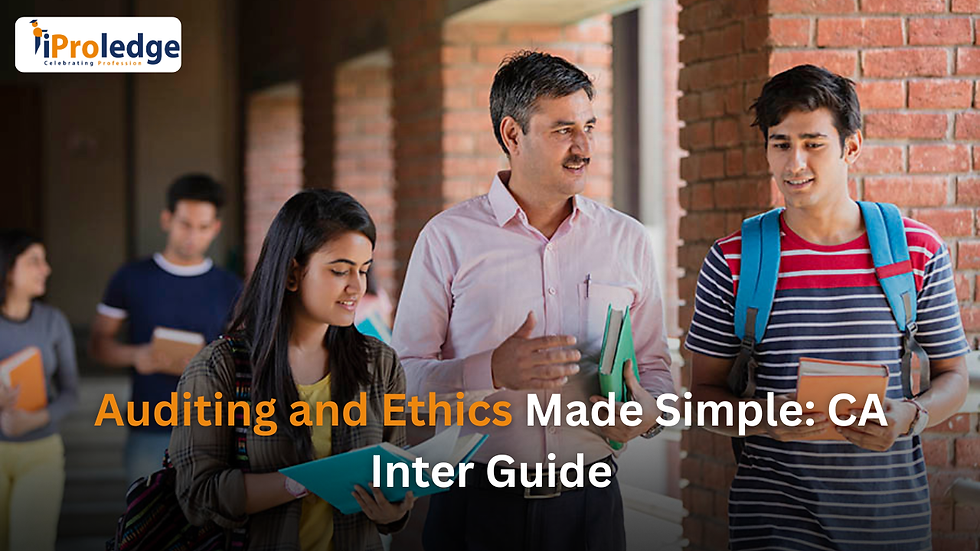How to Clear CS Executive in First Attempt – Expert Tips
- Shankargouda S Malipatil
- Aug 26, 2025
- 4 min read

How to Clear CS Executive in First Attempt – Expert Tips
It is completely possible to pass the CS Executive exam on your first try. Success is achievable with a concentrated approach and the appropriate preparation techniques. The following practical techniques can help you confidently ace the test:
Strategies for CS Executive Exam Subject Preparation
Paper 1: General Laws, Interpretation, and Jurisprudence
About 80% of the questions on this 100-point test are descriptive, while 20% are objective. Students must concentrate on one law at a time because it includes eighteen different laws in a variety of subjects How to Clear CS Executive in First Attempt – Expert Tips.
Candidates should be well-versed in the essential concepts and principles of each law in order to prepare. corresponding laws' goals, features, powers, & recent amendments should also be taken into consideration. To do well on the test, you will need to have a solid understanding of these ideas.
Paper 2: Company Law and Practices
the CS Executive. It’s split into two bits—first chunk (Company Law stuff) packs 60 marks, and the second (Admin and Meetings) gets 40. So yeah, that first part? It’s a big deal. If you’re not putting in extra hustle for it, you’re kinda asking for trouble.
Honestly, don’t just memorize the rules—get what they actually mean, check out a few juicy case studies, and figure out how this stuff plays out in the real world. And don’t even think about skipping the latest changes to the law. The examiners love to throw curveballs with recent amendments. So, keep your prep tight and your info fresh. You’ll thank yourself when you’re not blanking out during the test.
Establishing a Business, Industrial, and Labor Law (Paper 3)
This paper’s split into two parts—“Setting up a Business” (that’s the biggie, 60 marks) and “Industrial & Labor Laws” (the slightly smaller fish, 40 marks).
If you’re hoping to not totally bomb this, you gotta actually know your way around all those rules about wages, worker rights, and the zillion restrictions about hiring, firing, and stuff like that. Also, don’t just memorize; actually get which laws fit which business types. That way, when the exam hits you with one of those “give an example” curveballs, you won’t just blank out and start sweating.
Paper 4: Financial Management and Corporate Accounting: Preparation Advice
The only completely descriptive paper on the CS Executive exam is this one.
There are two sections to the paper:
Corporate Accounting (Part 1) (60 marks)
Financial Management (Part 2) (40 marks)
Rather than theory, it mostly comprises of numerical and practical questions.
Make it a point to routinely practice numerical problems.
Become more knowledgeable about fundamental accounting concepts like:
Journal entries
Financial statement preparation
Standards for accounting
Sheets of balances
Statements of cash flow
Determine which chapters are more important, then give them top priority in your schedule.
Paper 5: Securities Laws and Capital Markets: Preparation Advice
With a total of 16 chapters, the paper is split into two sections:
40 points for Part 1 (7 chapters)
60 marks for Part 2 (9 chapters)
The Companies Act
The SEBI Act
Additional relevant regulations
Practice subjects such as:
Securities issuance
Capital market products
Compliance and regulatory processes
Review significant case law and stay informed about new developments in capital market and securities law.
Paper 6: Preparation Advice for Economic, Commercial, and Intellectual Property Laws
There are two sections to the paper:
A. Section 1: 60 points
B . Part 2: 40 points
Concentrate on learning important acts like:
A. The Sale of Goods Act
B. The Consumer Protection Act
C. The Negotiable Instruments Act
Recognize the following ideas related to intellectual property rights (IPR):
A. IPR Types
B. Procedures for registration
C. Each law's rights and safeguards
Exam preparation requires consistent practice and review of both acts and IPR ideas.
To effectively answer descriptive questions, give priority to comprehending how laws are applied in real-world situations.
Paper 7: Preparation Advice for Tax Laws and Practices
This last CS Executive exam paper is broken up into two sections:
A. 60 marks for direct tax
B. Tax Indirect: 40 marks
Direct Tax Preparation:
A. Practice a variety of revenue streams, including capital gains, company income, housing property, and wages.
B. Know how each type of income is calculated and handled.
Getting Ready for Indirect Taxation:
A. Pay attention to the GST and customs laws.
B. Learn about GST's types, ideas, and structure.
C. Recognize the GST's effects on supply, exemptions, deductions, and income.
To score well, you must regularly practice theoretical ideas and tax computations.
Tips for Preparing for the CS Executive Exam
Make reading and revising them a regular part of your routine to help you remember them.
Since objective-type questions are present in all but Paper 4, practice them frequently.
Exam patterns, often asked themes, and question trends can be understood by examining previous year's question papers.
Note quick notes while you're learning; these will come in very handy while you're revising.
Consider answering every question that you can after finishing the syllabus to help you remember what you've learned.
Try taking practice exams like the iProledge CS Executive Mock Test Series. To help you spot errors and improve your weak areas, make sure the series covers every topic in the syllabus.





Comments